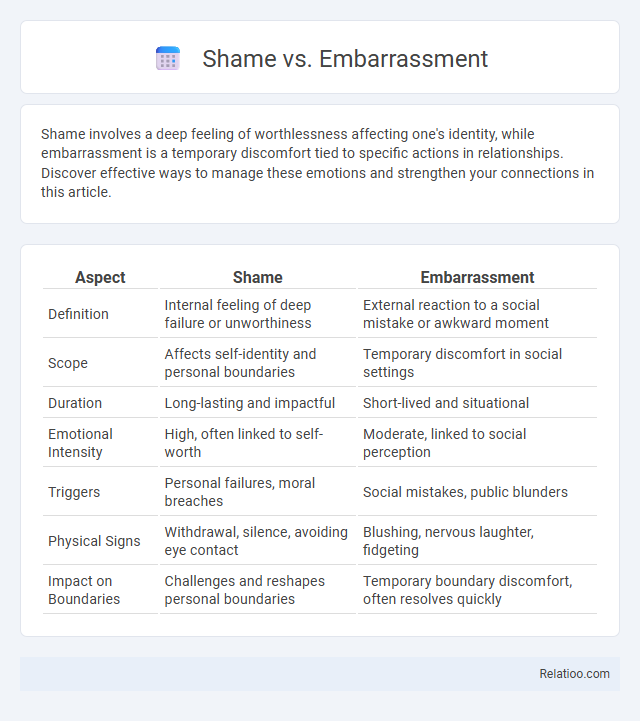Shame involves a deep feeling of worthlessness affecting one's identity, while embarrassment is a temporary discomfort tied to specific actions in relationships. Discover effective ways to manage these emotions and strengthen your connections in this article.
Table of Comparison
| Aspect | Shame | Embarrassment |
|---|---|---|
| Definition | Internal feeling of deep failure or unworthiness | External reaction to a social mistake or awkward moment |
| Scope | Affects self-identity and personal boundaries | Temporary discomfort in social settings |
| Duration | Long-lasting and impactful | Short-lived and situational |
| Emotional Intensity | High, often linked to self-worth | Moderate, linked to social perception |
| Triggers | Personal failures, moral breaches | Social mistakes, public blunders |
| Physical Signs | Withdrawal, silence, avoiding eye contact | Blushing, nervous laughter, fidgeting |
| Impact on Boundaries | Challenges and reshapes personal boundaries | Temporary boundary discomfort, often resolves quickly |
Understanding Shame and Embarrassment
Shame is a deep, pervasive feeling of worthlessness tied to one's self-identity, often stemming from perceived personal failures or moral shortcomings. Embarrassment is a milder, temporary emotional response to social awkwardness or minor mistakes, usually linked to specific situations rather than self-worth. Understanding the distinction emphasizes shame's impact on self-esteem and chronic emotional health, while embarrassment typically triggers momentary discomfort without lasting self-judgment.
Key Differences Between Shame and Embarrassment
Shame and embarrassment both involve feelings of discomfort related to social perception, but shame is a deeper, more pervasive emotion tied to a negative evaluation of your entire self, whereas embarrassment arises from specific actions or situations and is usually more temporary. Shame often leads to withdrawal because it affects your core identity, while embarrassment tends to cause awkwardness or self-consciousness without fundamentally altering your self-worth. Understanding these key differences helps you manage your emotional responses more effectively by recognizing whether the feeling is about your behavior or your self-value.
Psychological Roots of Shame
Shame originates from deep psychological roots tied to one's self-identity and perceived failures, often resulting in a painful sense of worthlessness or defectiveness. Unlike embarrassment, which is a fleeting emotional response to social faux pas, shame impacts Your core self-concept and can lead to long-lasting feelings of inadequacy and self-condemnation. Understanding these distinctions helps in recognizing the profound internal conflicts that shame creates within the psyche.
Causes and Triggers of Embarrassment
Embarrassment is typically triggered by social awkwardness, mistakes in public, or perceived judgment from others, often involving minor breaches of social norms or personal expectations. Shame, by contrast, stems from a deeper sense of personal failure or moral shortcomings, affecting your core self-worth and identity. Unlike embarrassment, which usually fades quickly, shame can have prolonged emotional effects rooted in internalized negative beliefs.
How Shame Impacts Mental Health
Shame deeply affects mental health by fostering feelings of worthlessness and self-criticism, often leading to anxiety and depression. Unlike embarrassment, which is typically short-lived and linked to specific events, shame creates a pervasive negative self-view that can erode your self-esteem over time. Understanding the distinct psychological impact of shame can guide more effective coping strategies and promote emotional well-being.
Social Implications of Embarrassment
Embarrassment often involves temporary discomfort from social mistakes, leading to self-consciousness and a desire to avoid negative judgment from others. Unlike shame, which can deeply impact self-worth and identity, embarrassment primarily influences social behavior by encouraging conformity and learning from social norms to maintain relationships. Your ability to navigate embarrassment effectively can strengthen social bonds and improve interpersonal communication.
Coping Mechanisms for Shame
Effective coping mechanisms for shame include practicing self-compassion, which helps counteract harsh self-criticism and fosters emotional resilience. Cognitive-behavioral techniques, such as reframing negative thoughts and challenging shame-inducing beliefs, can reduce the intensity of shame experiences. Building supportive social connections provides validation and reduces isolation, which is crucial for managing the overwhelming feelings associated with shame.
Strategies to Overcome Embarrassment
Embarrassment often arises from social situations where You feel self-conscious or judged, but unlike shame, it is typically less pervasive and easier to manage. Strategies to overcome embarrassment include cognitive reframing to view the situation with humor or perspective, practicing mindfulness to stay grounded in the present, and gradually exposing Yourself to situations that trigger discomfort to build resilience. Developing self-compassion and focusing on personal growth rather than perceived social failures can significantly reduce the intensity and frequency of embarrassing moments.
Shame vs Embarrassment in Relationships
Shame in relationships often stems from feeling fundamentally flawed or unworthy, impacting Your sense of self-worth and connection with others. Embarrassment, on the other hand, arises from specific social mistakes or awkward moments, causing temporary discomfort without deeply affecting Your identity. Understanding the difference helps manage emotional responses and fosters healthier communication between partners.
Cultivating Self-Compassion and Resilience
Shame involves a deep, painful feeling of being fundamentally flawed, while embarrassment is a milder, often temporary reaction to a social slip or awkward moment; cultivating self-compassion enables you to acknowledge these emotions without harsh self-judgment. Building resilience through mindfulness and positive self-talk helps transform shame into growth opportunities, fostering emotional strength and healthier coping mechanisms. Embracing self-compassion supports emotional healing, allowing you to navigate shame and embarrassment with greater emotional balance and self-acceptance.

Infographic: Shame vs Embarrassment
 relatioo.com
relatioo.com